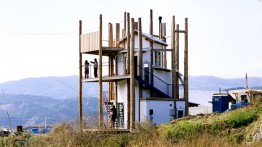Current Work | Toyo Ito: Rethinking Architecture from Modernism
Thursday, June 17, 2021, 7 - 9pm

Image courtesy of Naoya Hatakeyama.
This event will be conducted through Zoom. Please register in advance here. Zoom account registration is required.
Toyo Ito founded his Tokyo-based office in 1971. Among the firm’s main works in Japan are Sendai Mediatheque and Tama Art University Library, Hachioji Campus. His international projects include the Serpentine Gallery Pavilion (UK), Torres Porta Fira (Spain), Museo Internacional del Barroco (Mexico), and National Taiwan University, College of Social Sciences (Taiwan).
After a devastating earthquake struck northeastern Japan in 2011, Ito launched Homes-for-All, an initiative that built 16 gathering places for disaster victims living in temporary housing units. Five years later, in response to earthquakes in the country’s Kumamoto region, he oversaw the building of an additional 100 Homes-for-All.
In 2011 Ito established Ito Juku, an architectural school focused on the future of cities and architecture. Since 2012, he has worked to revitalize the small island of Omishima in southwestern Japan, collaborating with Ito Juku members and the local community.
Recent and current projects include:
- Toyo Ito Museum of Architecture, a two-building compound in Imabari, Japan. One structure, Steel Hut, is a faceted steel-skinned exhibition space; the other, Silver Hut, is a series of vaulted roofs covering an archive and space for workshops and events.
- National Taichung Theater, a 551,000-seat performing arts complex in Taichung, Taiwan, comprising three theaters as well as restaurants, retail, and administrative spaces, an outdoor amphitheater, and a roof garden.
- Minna no Mori Gifu Media Cosmos, a public library, art gallery, studio, and workshop housed under an undulating wood ceiling in Gifu, Japan.
Ito’s lecture will focus on rethinking what he describes as the “Modernist ideology” that has encouraged “the massive development of cities along with the global economic system.” Noting the recent “time-out” imposed by the Covid-19 virus, he asks, “Will the society that is metropolitan-oriented change? Or will we return to where we were?”
Toyo Ito’s work has been recognized internationally, including with the Golden Lion from the International Architecture Exhibition of La Biennale di Venezia for Lifetime Achievement in 2002, the Royal Gold Medal from the Royal Institute of British Architects in 2006, the Pritzker Architecture Prize in 2013, and the UIA Gold Medal in 2017.
The lecture will be followed by a conversation and Q&A moderated by architect Toshiko Mori, founder of New York-based Toshiko Mori Architect, Robert P. Hubbard Professor in the Practice of Architecture at Harvard University GSD, and co-founder of VisionArc. She is a fellow of the American Academy of Arts & Sciences and a member of the American Academy of Arts and Letters, and recently received the AIA/ACSA Topaz Medallion for Excellence in Architectural Education.
This event is organized by The Architectural League of New York and co-presented with The Irwin S. Chanin School of Architecture of The Cooper Union.




